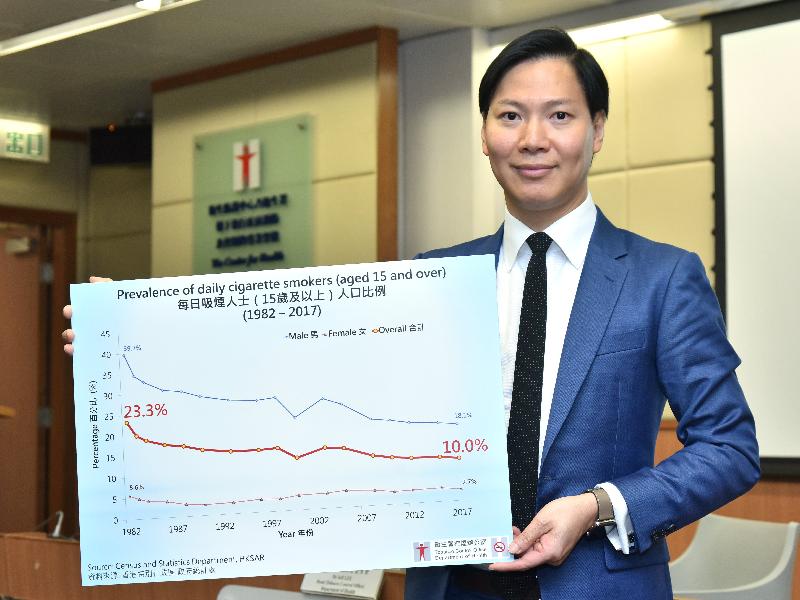Government survey reveals reduction in smoking (with photo)
***********************************************************
The latest Thematic Household Survey (THS) published by the Census and Statistics Department today, which was conducted from June to September 2017, contains the findings of the survey on the pattern of smoking among Hong Kong residents. There were 615 000 daily smokers in 2017, with 527 000 males and 88 100 females - fewer than the total of 641 300 smokers in 2015. Daily consumption also decreased from 13.1 cigarettes in 2015 to 12.4 in 2017.
In another school-based survey conducted from November 2016 to June 2017 on smoking among students, the smoking prevalence among Primary 4 to 6 students and Secondary 1 to 6 students was 0.1 per cent and 2.5 per cent respectively, representing a drop of 0.1 and 0.2 percentage points compared to the 2014/15 survey. The survey was done by the School of Public Health of the University of Hong Kong (HKU) and commissioned by the Food and Health Bureau.
Speaking at a press conference today, the Head of the Tobacco Control Office (TCO) of the DH, Dr Lee Pui-man, said that the overall prevalence of smokers has been on a decreasing trend in the past 30 years or so from 23.3 per cent in the early 1980s to 10.0 per cent in 2017 (See attachment). This shows that the Government's approach to tobacco control, including legislation, law enforcement, taxation, health promotion and smoking cessation services, has proved to be effective, along with support from different sectors of the community.
Dr Lee said, "We will continue to adopt a progressive and multi-pronged approach to tobacco control, with the aim of further reducing the overall smoking prevalence to single digits."
"While our tobacco control work has proven effective, we also face challenges posed by electronic smoking devices, which have become more popular. The 2017 survey shows that more citizens have tried electronic smoking devices, including electronic cigarettes and heat-not-burn tobacco products, compared to the 2015 survey."
According to the THS Report, the number of daily e-cigarette users was 5 700 persons in 2017, while no significant number was recorded in 2015. Separately, while the survey done by HKU's School of Public Health showed improvements in students' use of e-cigarettes, there were still about 0.8 per cent of secondary students who were current e-cigarette users.
"The Government is very concerned about the overall growing number of people in using e-cigarettes. To prevent the situation from worsening, we plan to strengthen the monitoring and regulation of these electronic smoking devices, and will continue our publicity drive to educate the public on the potential harms of using these devices," Dr Lee said.
Dr Lee pointed out that the increased proportion of smokers with no intention to quit smoking is another challenge of the Government’s tobacco control work. He said, "Although we have seen a gradual increase in the proportion of smokers who are aware of smoking cessation services in the past decade, the proportion of smokers who have not tried to and have no intention to quit smoking has increased. This is reflected in the increasing difficulties in recruiting smokers to participate in smoking cessation programmes. To tackle the problem, the DH has been strengthening community smoking cessation services for smokers who have not actively sought assistance on smoking cessation. For instance, by providing mobile smoking cessation services in the community so as to approach the smokers more proactively and offer more convenient services."
Dr Lee added that the Government thanks its community partners for their support and contribution in the work of tobacco control, which helps to keep Hong Kong's daily smoking prevalence as one of the lowest in the world. Looking ahead, the Government will continue to push ahead with its tobacco control work, step up public education and promotion, and explore new initiatives to enhance smoking cessation services, with a view to encouraging more smokers - especially "hard-core" smokers - to attempt and succeed in quitting smoking.
Ends/Thursday, March 22, 2018
Issued at HKT 14:30
Issued at HKT 14:30
NNNN





